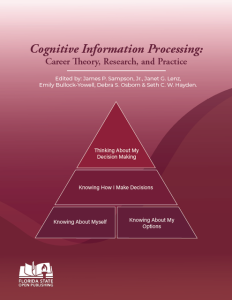edited by James P. Sampson, Jr., Janet G. Lenz, Emily Bullock-Yowell, Debra S. Osborn, and Seth C. W. Hayden
 I don’t know how to make this choice. While working in a university career center, I have heard these words of distress countless times from students who were feeling the unbearable weight of making a decision that they saw as having the power to shape their future, their lives, and their identities in significant and lasting ways. Fortunately, during a vocational psychology course, I studied cognitive information processing (CIP) theory, the pyramid of information processing, and the CASVE cycle, which gave me the confidence and competence to navigate the complicated decision-making process with students who felt emotionally and mentally overwhelmed by academic and career choices.
I don’t know how to make this choice. While working in a university career center, I have heard these words of distress countless times from students who were feeling the unbearable weight of making a decision that they saw as having the power to shape their future, their lives, and their identities in significant and lasting ways. Fortunately, during a vocational psychology course, I studied cognitive information processing (CIP) theory, the pyramid of information processing, and the CASVE cycle, which gave me the confidence and competence to navigate the complicated decision-making process with students who felt emotionally and mentally overwhelmed by academic and career choices.
The need to make occupational decisions is universal. Cognitive Information Processing: Career Theory, Research, and Practice provides a comprehensive exploration of CIP theory, which serves as the theoretical framework for understanding the cognitive processes that affect how individuals interpret and utilize career-related information to guide their career choices.
Drawn from both cognitive and counseling psychology, CIP theory underscores the various mental processes involved in career decision making, including information gathering, self-awareness, and goal setting. As a career intervention, CIP theory is intended to assist individuals with career-related problems by enhancing their understanding of both problem solving and decision making. One tool used to accomplish this goal is the CASVE cycle. With each letter representing a step in the decision-making model, readers are guided through a structured process that helps them make informed choices. By following this model, individuals can be supported in avoiding impulsive decisions, minimizing risks, and increasing the likelihood of achieving their desired outcomes.
Published in 2023, this book focuses on integrating theory, research, and practical applications, making it an invaluable resource with applicability across a multitude of domains. Educators and researchers studying vocational behavior and aspiring to understand the future direction(s) of CIP theory would benefit from consulting Chapter 21. Likewise, practitioners seeking evidence-based career interventions and individuals navigating the complexities of career decision-making will discover instrumental guidance in the chapters dedicated to understanding occupational, educational, and training choices, as well as those exploring the psychological and developmental factors influencing an individual’s readiness to make career decisions. For employment agencies and government policymakers aiming to establish career-focused initiatives, Chapter 16 offers both a comprehensive blueprint and essential resources for developing and executing successful career services programs.
One of the book’s strengths, as stated above, is its integration of theory with practical applications. Each chapter provides insights into how CIP theory can be translated into effective career counseling interventions. The authors lay out the discussion of complex factors that affect career decisions in a straightforward and digestible manner. Practitioners and individuals will find a set of easily understandable concepts that will equip them with the knowledge and skills needed to inform effective and satisfying academic and career decision making. Through case studies, reflective exercises, practical guidelines, and summaries offered at the end of each chapter, readers will find that these skills can also be applied to a myriad of decision-making opportunities.
In addition to its theoretical and practical contributions, this book’s attention to the impact of systemic inequalities and cultural factors on career opportunities and outcomes is also notable. The authors expertly promote a culturally sensitive approach to career counseling that recognizes, respects, and affirms the diversity of individuals’ identities, values, and beliefs. They further emphasize the significance of an inclusive and empowering counseling atmosphere that fosters clients’ self-awareness and agency while making career choices. Case examples and reflective activities are presented to encourage readers to examine their own biases and assumptions that may hinder a culturally competent approach to career counseling.
Cognitive Information Processing: Career Theory, Research, and Practice is published through Florida State Open Publishing as an open-access resource. By making the book available for free, the authors have eliminated the financial barrier to accessing this invaluable asset aimed at equipping readers with theory-based knowledge of vocational behavior and career interventions. This accessibility benefits students, educators, researchers, practitioners, and anyone wanting to establish cost-effective and evidence-based career development intervention programming that helps individuals to make informed career decisions across their life span.
Sampson, J. P., Jr., Lenz, J. G., Bullock-Yowell, E., Osborn, D. S., & Hayden, S. C. W. (Eds.). (2023). Cognitive information processing: Career theory, research, and practice. Florida State Open Publishing. https://manifold.lib.fsu.edu/projects/cognitive-information-processing-career-theory-research-and-practice
Reviewed by: Nikkie Bailey, MS, LCSW
